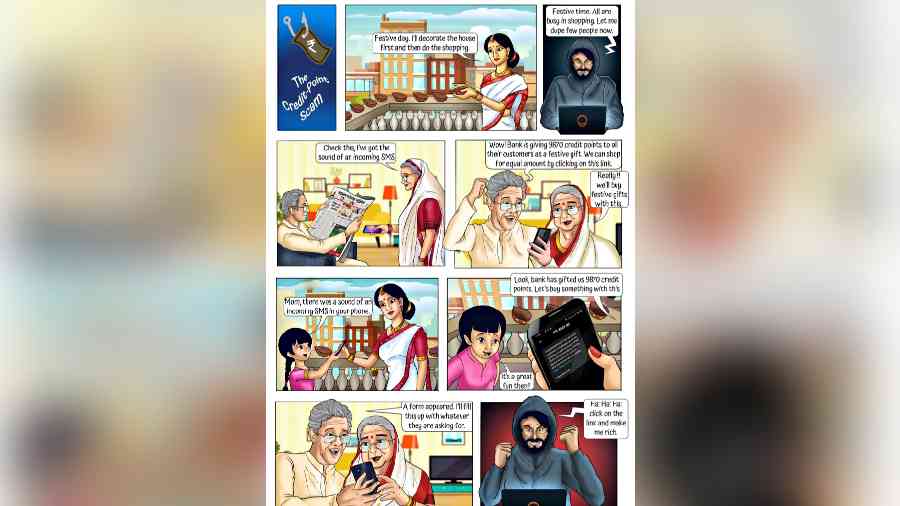The state information technology department has created a comic strip depicting how people are falling prey to at least 12 types of online frauds to create awareness in society.
A large number of frauds are committed through Facebook, impersonation of bank officials, sharing of OTP, misuse of e-commerce platforms, clicking on unknown links, luring people with false credit points and spyware-infected cellphone charging points in public places.
The comic strip — Cyber Hypnosis — is available online and in a booklet form. It is being sent to schools and colleges, too, said senior officials of the cyber security centre of excellence of the state government.
“The comic strip is made of small stories based on 12 types of modus operandi followed by online fraudsters. It has been published in a booklet form. These stories can also be accessed separately by scanning a QR code for each of them, printed on the last page of the booklet,” said Sanjay Kumar Das, joint secretary of the state IT department, at a cyber security congress organised by Infosec Foundation on Friday.
One of the stories depicts how people post their photographs on Facebook to get “likes” and give away their current location. That often leads to stalking in the real world.
The booklet has a chapter that describes how a fraudster, posing as a bank official, could fish out account details of the victim and then make online transactions from his or her account without the person’s knowledge.
“I am your Bank Manager. Your KYC has expired. So we are freezing your account,” a fraudster tells his target.
Many of those who receive such a call get nervous and are keen on sharing their bank details with the caller to prevent the account from being frozen.
Once the account details and the personal identification number are shared, the fraudster transfers funds from the account, a story in the comic strip says. Another story tells how fraud is committed through misuse of e-commerce platforms.
People who try to sell anything through an e-commerce platform are vulnerable to such fraud.
“When someone, especially an elderly person, tries to sell an old product through an e-commerce platform, fraudsters may target them,” said a police officer experienced in handling cyber crimes.
The comic strip tells the story of an elderly man who wants to sell an old sofa online. The man is approached by a prospective buyer who agrees to purchase the sofa without physical verification and proposes to send the money online through a link.
“Just click on Pay and enter OTP,” the fraudster tells the old man.
The latter clicks on the link without reading it and unknowingly transfers money to the fraudster’s account. People are also lured by text messages mentioning that they have received credit points which can be redeemed by clicking on a link, a story tells the readers.
The IT department official said they would soon launch a mobile van containing cyber awareness materials in collaboration with Kolkata police.
HOW THEY TRY TO TRICK YOU
■ A fraudster poses as someone else on social media and befriendsa woman and persuades her to share her private videos in the garb ofa relationship. The woman is then blackmailed with the videos■ Charging a mobile phone from a free charging point in a publicplace can lead to hacking of the phone if the charging point is infectedwith malware
■ Girls or young women interested in modelling post their photo-graphs on social media. They can be exploited by imposters, who may
pose as movie directors or model coordinators and ask the victims tomeet them with ill intentions■ Cheating through phishing mails from persons known to the victimis common. The victim is under the impression that he or she is beingasked to pay a sum by a person known to him or her
■ Fake calls from LPG dealers threatening to discontinue gas connec-tion can lead to online transfer of money by scanning QR codes







